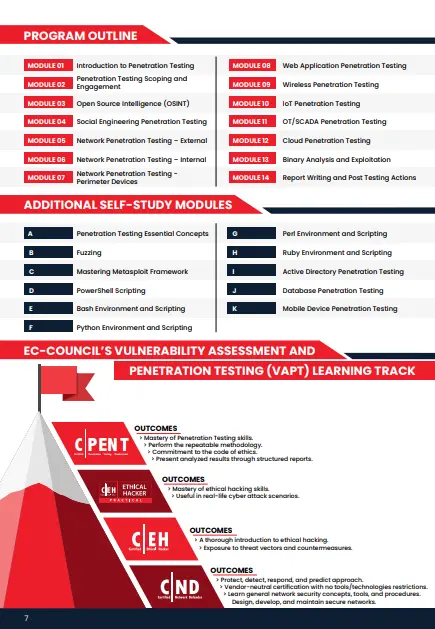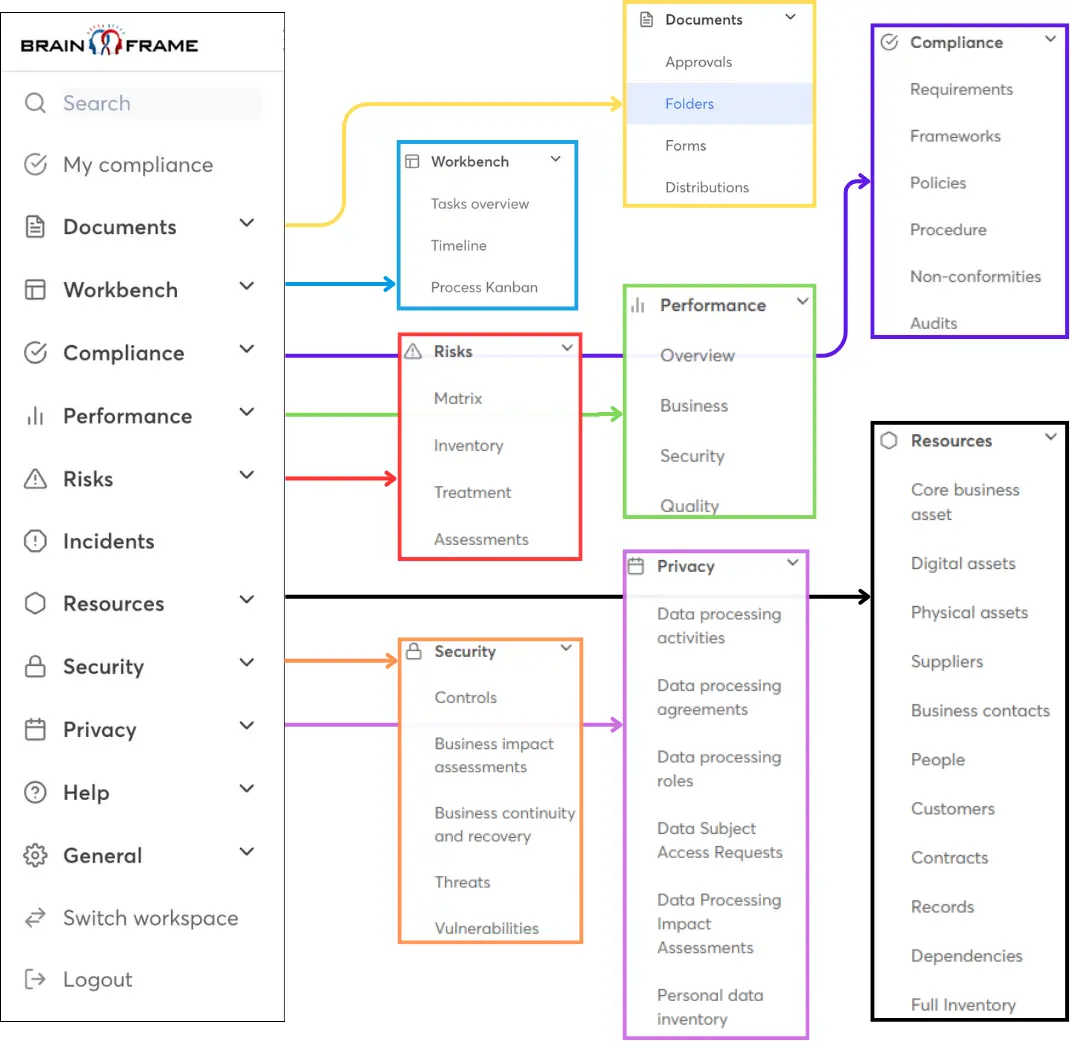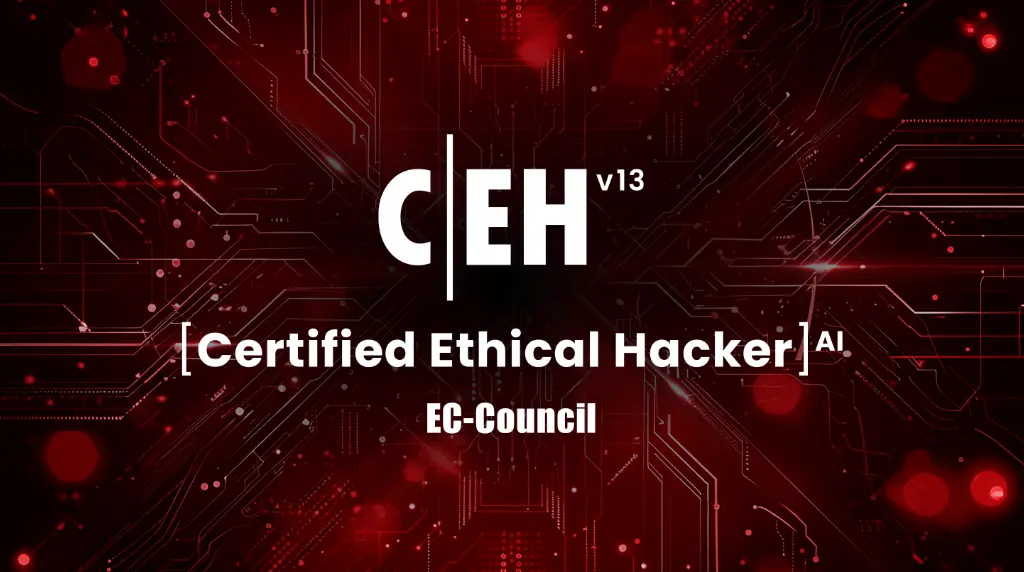Download Brochure
If you want to learn more about the training, check out the official training brochure!

What is included
- One (1) Year Access to the e-courseware.
- Six (6) months access to EC-Council's official online lab environment.
- Certification or Exam voucher valid for a period of one (1) year.
- Certification and examination fees are included in the price of the training course.
- Expert instructor-led training modules with streaming video presentations and learning supplements for an all-inclusive training program that provides the benefits of classroom training at your own pace with a validity of one (1) year.
- 20% reduction on the first year subscription for our all-in-one ISMS/GRC management solution
Official ECC-Reseller-Certificate
World's #1 in Ethical Hacking Certification
The Certified Ethical Hacker (CEH) provides an in-depth understanding of ethical hacking phases, various attack vectors, and preventative countermeasures. CEH v13 powered with AI capabilities will teach you how hackers think and act so you will be better positioned to set up your security infrastructure and defend against attacks. By providing an understanding of system weaknesses and vulnerabilities, the CEH course helps students learn to protect their organizations and strengthen their security controls in order to minimize the risk of a malicious attack.
CEH v13 powered with AI capabilities was built to incorporate a hands-on environment and systematic process across each ethical hacking domain and methodology, giving you the opportunity to work toward proving the required knowledge and skills needed to achieve the CEH credential and perform the job of an ethical hacker.
Why choose CEH?
92%
Of hiring managers prefer candidates with a CEH Certification.
#1
Among Ethical Hacking Certification according to ZDNet.
50%
Of professionals received promotions after completing the CEH.
Elevate Your Cybersecurity Expertise
Join the AI revolution with the latest version of the Certified Ethical Hacker (C|EH v13) program. This globally recognized certification equips you with cutting-edge skills to secure systems and networks against evolving cyber threats.
Key Highlights of C|EH v13:
- AI-Powered Capabilities: Learn to use AI for automating threat detection, predicting breaches, and responding swiftly to incidents.
- Comprehensive Curriculum: Master ethical hacking methodologies across five phases, now integrated with AI.
- Hands-on Experience: Gain practical expertise with 221 labs, 550 attack techniques, and 4,000+ commercial-grade tools.
- Advanced Skills: Hack AI-driven technologies and secure them against potential threats.
- Certification Excellence: Earn the No.1 Ethical Hacking Certification, accredited by U.S. DoD 8140, ANAB 17024, and NCSC, and aligned with NICE 2.0 and NIST standards.
Why Choose CEH v13?
- Achieve 40% efficiency and double productivity with AI-enhanced skills.
- Compete in global Capture the Flag (CTF) competitions and validate your skills in practical and knowledge-based exams.
- Enhance employability with top organizations, including Fortune 500 companies and government agencies.
Prepare for the future of cybersecurity with CEH v13 and become a leader in ethical hacking.
Who should take this course?
- IT Security Administrator
- Information Security Analyst
- Infosec Security Administrator
- Cybersecurity Analyst (Level 1, Level 2, & Level 3)
- Network Security Engineer
- SOC Security Analyst
- Penetration Tester
- Cyber Delivery Manager
- Application Security Risk
- Threat Modelling Specialist
- Web Application Penetration Testing
- AI/ML Security Engineer
- Machine Learning Security Specialist
- AI Penetration Tester
- AI/ML Security Consultant
- Senior Security Consultant
- Information Security Manager
- Senior SOC Analyst
- Solution Architect
- Cybersecurity Consultant
- Cyber Defense Analyst
- Vulnerability Assessment Analyst
- Warning Analyst
- All-Source Analyst
- Cyber Defense Incident Responder
- Research & Development Specialist
- Senior Cloud Security Analyst
- Third Party Risk Management
- Threat Hunting Analyst
- Crypto Security Consultant
- Ethical Hacker
- SIEM Threat Responder
- Product Security Engineer / Manager
- Endpoint Security Engineer
- Cybersecurity Instructor
- Red Team Specialist
- Data Protection & Privacy Officer
- SOAR Engineer
- AI Security Engineer
- Sr. IAM Engineer
- PCI Security Advisor
- Exploitation Analyst (EA)
- Zero Trust Solutions Engineer / Analyst
- Cryptographic Enginee

Get CEH trained from anywhere in the world with World-Class instructors
Course Outline
Module Name | Description |
Introduction to Ethical Hacking | Learn the basics of ethical hacking, information security controls, laws, and standard procedures. |
| Footprinting and Reconnaissance | Understand how to gather target information using advanced techniques and tools. |
Scanning Networks | Learn to identify live hosts, open ports, and services using network scanning techniques. |
Enumeration | Explore techniques to extract detailed information like usernames, group memberships, and network shares |
Vulnerability Analysis | Master vulnerability identification in networks, systems, and endpoints using various assessment tools. |
System Hacking | Dive into methods like password cracking, privilege escalation, and data hiding to gain unauthorized access. |
Malware Threats | Understand malware types, their behavior, and analysis techniques, along with countermeasures. |
Sniffing | Learn packet sniffing techniques to analyze network traffic and defend against sniffing attacks. |
Social Engineering | Explore human-level vulnerabilities and countermeasures for preventing social engineering attacks. |
Denial-of-Service (DoS) | Study DoS and DDoS attack techniques and learn tools and defenses to mitigate them. |
Session Hijacking | Learn to hijack network-level sessions and secure them against unauthorized access. |
Evading IDS, Firewalls, and Honeypots | Discover techniques to bypass intrusion detection systems, firewalls, and honeypots, and implement countermeasures. |
Hacking Web Servers | Understand methodologies and tools for identifying and securing vulnerabilities in web servers. |
Hacking Web Applications | Learn comprehensive methods for auditing vulnerabilities and securing web applications. |
SQL Injection | Study SQL injection techniques to exploit database vulnerabilities and methods for prevention. |
Hacking Wireless Networks | Explore encryption standards, attack methodologies, and security measures for wireless networks. |
Hacking Mobile Platforms | Learn risks and vulnerabilities specific to Android and iOS, along with mobile security tools. |
IoT Hacking | Study the challenges of IoT and OT security, attack methodologies, and defensive strategies. |
Cloud Computing | Dive into cloud security concepts, threats, and countermeasures, including containerization and serverless computing. |
Cryptography | Understand encryption algorithms, cryptographic tools, and techniques to secure data effectively. |
Access to a learning lab
100% Virtualization for a complete learning experience
Full access to pre-configured targets, networks, and the attack tools necessary to exploit them
Pre-configured vulnerable websites
550 Attack techniques covered
4000+ Hacking tools
Wide range of target platforms
CEH Exams at a glance
| Exam Details | CEH Knowledge Exam | CEH Practical Exam |
|---|
| Number of Questions/Practical Challenges | 125 Questions | 20 Practical Challenges |
| Test Duration | 4 Hours | 6 Hours |
| Test Format | Multiple-Choice Questions (MCQ) | Performance-based Cyber Range |
| Test Availability | ECC Exam, VUE ASPEN, iLabs | iLabs |
| Exam Prefix | 312-50 (ECC Exam), 312-50 (VUE) | N/A |
| Passing Score | 60% - 85% | 60% - 85% |
Achieving the CEH Certification Credential
After taking an authorized course, candidates can attempt the CEH exam. Candidates that successfully pass the exam will receive their CEH certificate and membership privileges. After proving knowledge by achieving the CEH credential, candidates have the added option to proceed to attempt the CEH (Practical) exam to prove their skills and abilities. The CEH (Practical) is a 6-hour practical exam created by subject matter experts in the ethical hacking industry. The exam tests skills and abilities in a timed environment across major operating systems, databases, and networks. Candidates with both the CEH and CEH (Practical) certifications are designated as CEH Masters, having validated the full scope of their abilities.
CEH (ANSI)
Exam Title: Certified Ethical Hacker (ANSI)
Exam Code: 312-50 (ECC Exam Portal) / 312-50 (VUE)
Number of questions: 125 of theory and 20 of practice
Durations: 4 hours of theory and 6 Hours of practice
Availability: ECC EXAM* / VUE
- Local proctor for Private and in-person courses.
- Live remote proctor for online ECC Exam option.
Passing score: Please refer to https://cert.eccouncil.org/faq.html

CEH Certification Exam earned College Credit Recommendations from the American Council on Education (ACE) For more info, click here.
Frequently asked questions
Here are some common questions about our company.
| Question | Answer |
|---|---|
| Is CEH v13 for beginners? | CEH is a great place to start your career in cybersecurity, but you’re required to have some knowledge before applying. It’s recommended that you have a minimum of 2 years of IT security experience before attempting CEH. If you don’t have the experience and are just getting started on this path as an entry-level professional, we recommend taking our Cybersecurity Essentials Series, where you can learn the foundations required to pursue mid-level and specialization certifications like CEH, CND, CHFI, CTIA, ECIH, CSA, CCISO, and others. |
| Are there any prerequisites? | There are no specific prerequisites for the CEH program. However, we strongly recommend that candidates possess a minimum of 2 years of experience in IT security before attempting CEH. CEH training involves testing systems and using them for purposes not originally intended. Candidates should understand the basic functions of those IT systems before attempting to hack them. If you do not possess the foundational skills in IT and networking, we recommend starting with our Cybersecurity Essentials Series. |
| Do I need Open AI API Credits for CEH v13? | The CEH v13 exposes cybersecurity professionals to the use of AI in performing the role of an ethical hacker. As Open AI owns the proprietary technology, the purchase of its API credits is required. In our test case, we consumed less than $1 of credit, although individual results may vary based on usage. Each student is required to purchase the licenses individually. EC-Council provides Lab Guides and walkthrough videos for students who cannot buy API credits. |
| What does a Certified Ethical Hacker do? | Certified Ethical Hackers are employed to improve an organization’s security posture. Ethical hacking involves systematically identifying, evaluating, testing, and reporting vulnerabilities. With CEH v13, Certified Ethical Hackers also use AI tools to enhance their ability to identify, exploit, and secure vulnerabilities in systems and networks. |
| Is CEH worth pursuing? | Holding a CEH certification communicates to employers that you possess the baseline knowledge and skills to be an effective member of the security team. Cybersecurity is rapidly growing, with projected job growth of 33%. CEH alumni report a 50% promotion rate, and 92% of hiring managers prefer candidates with CEH for ethical hacking roles. |
| What are the benefits of CEH? | For over 20 years, EC-Council has worked to build the best ethical hacking certification on the market. CEH covers relevant job roles and skills employers need. It is ANAB-accredited and recognized by various governments like the US Department of Defense and GCHQ. CEH v13 integrates AI skills to improve productivity and drive efficiency in cybersecurity operations. |
| How much money does a Certified Ethical Hacker make? | Ethical hackers earn an average of $110,757 per year in the US, with the 90th percentile earning above $137,000. CEH has been ranked among the top 5 highest-paid cybersecurity certifications for the last 10 years. |
| Is CEH a popular cybersecurity certification? | Yes, CEH is well-known in the cybersecurity field. As of September 2024, over 22,000 global job ads on LinkedIn require CEH certification. CEH v13 is mapped to 49 job roles across multiple industries. |
| Is CEH in demand? | CEH is one of the most in-demand cybersecurity certifications globally and is recognized by the US Department of Defense for its cyber workforce. It is also integrated into over 1,200 universities' computer science and cybersecurity programs. |
| Why should I consider getting CEH? | CEH provides comprehensive knowledge and skills across cybersecurity domains, opening doors to diverse career paths. It’s recognized globally and offers a high return on investment with reasonably priced training and certification. |
| How much does CEH cost? | CEH pricing depends on factors like online self-paced, online live, or in-person training. Speak to a career advisor for detailed costs and funding options. |
| How much does the CEH training cost? | CEH training is offered worldwide in formats like self-paced, live online, or in-person boot camps. Costs vary based on region and format. Contact EC-Council or an Authorized Training Center for specific details. |
| Are there funding options available? | Yes, EC-Council and its partners offer various funding options, including payment plans, discount plans, and military or tuition assistance programs. |
| Which certification is best for hacking? | The CEH program helps you understand hackers by getting into their mindset. CEH is widely recommended by professionals, industry leaders, and hiring managers as the world’s number one ethical hacking certification. |
| Which is the world’s #1 ethical hacking course? | EC-Council’s Certified Ethical Hacker (CEH) certification is globally recognized as the number one ethical hacking certification. Alumni frequently report career advancements and improved organizational security due to CEH training. |
| Question | Answer |
|---|---|
| How do I get certified? | To take the CEH Examination, you must first be deemed eligible. We offer two paths to eligibility: 1. Attend official training: (a) Online learning through iClass, (b) Authorized Training Center (ATC) in over 140 countries, or (c) Partner universities. 2. Eligibility application: (a) Experience-based: Skip training if you already have relevant experience, or (b) Apply for exam eligibility if you didn’t attend training. Once approved, EC-Council will help you schedule the exam. The exam can be proctored at training centers, remotely, or at over 4,500 VUE testing centers. |
| What are the pass rates for CEH? | EC-Council doesn’t publish exact pass rates. Global rates range from 60% to 85%. The CEH exam is ANAB-accredited and is evaluated for fairness. Strong IT skills and preparation using official materials are key to success. The exam uses cut scores based on domain weight and performance. |
| What score do I need to pass the exam? | Passing scores for CEH exams vary due to rotating question sets. Scores typically range from 65% to 85%. The practical exam is 100% hands-on with 20 scenarios. |
| What if I don’t pass on my first attempt? | EC-Council has an official retake policy. You can check the policy and plan your next attempt. Retake fees may apply. |
| Can I skip training and just get certified? | Yes, you can skip training and apply for eligibility to take the exam directly, provided you meet experience requirements. Refer to the eligibility guidelines for details. |
| Do I have to maintain my certification? | Yes, certifications must be maintained through EC-Council's Continuing Education Policy (ECE). |
| How do I know if I’m ready to take the CEH exam? | The most common preparation method is official training, including hands-on activities in live Cyber Ranges. Students can use mock exam questions and resources to evaluate their readiness. Self-assessment of knowledge and review of exam domains is recommended for direct candidates. Retake options are available for some training packages. |
| I’ve watched videos on YouTube about CEH. Does that prepare me to take the exam? | While there are many self-published videos on YouTube, official CEH training is not available on these platforms. Self-published videos may provide valuable insights but are not a substitute for official training and cannot be used as a valid method of preparation for exam eligibility. |
| I’m currently studying CEH at a university. How do I request my certification exam? | Your options depend on your program. For EC-Council University students, log in to your MyECCU account and contact your counselor. For other EC-Council Academia Partners, consult your instructor or email [email protected] to connect with student services. |
| Question | Answer |
|---|---|
| Do I need Open AI API Credits for CEH v13? | The CEH v13 exposes cybersecurity professionals to the use of AI in performing the role of an ethical hacker. As Open AI owns the proprietary technology, the purchase of its API credits is required. In our test case, we consumed less than $1 of credit, although individual results may vary based on usage. Each student is required to purchase the licenses individually. EC-Council provides Lab Guides and video-based walkthroughs for students unwilling or unable to buy Open AI APIs. |
| How long does it take to become a Certified Ethical Hacker? | The total time it takes to become a certified ethical hacker can vary by student, but the typical answer is 5 days. CEH official training is structured as a 5-day boot camp, with testing typically delivered at the end of the 5th day as a 4-hour exam. Students who choose an on-demand or self-paced course through iClass or decide to defer their testing date may take longer to achieve the certification. |
| What does CEH cover? | The CEH program and exam cover a variety of topics that center around the tactics and procedures required to be a tactical cybersecurity professional. Spanning the entire kill-chain process, CEH includes topics such as footprinting and reconnaissance, scanning, gaining access, maintaining access, and covering tracks. The 5-phase ethical hacking process applies to scenarios including traditional networks, cloud, hybrid, IoT systems, and more. CEH also covers emerging attack vectors and security strategies. |
| What will I learn in CEH? | Security professionals attending this program will learn ethical hacking, including the Cyber Kill Chain, vulnerability assessment, and social engineering. You’ll explore how hackers operate, identify weaknesses in target systems, and apply remediation strategies. CEH also focuses on automating tasks using AI tools and hacking AI systems. |
| How do I learn ethical hacking? | Ethical hacking requires extensive training, hands-on experience, and knowledge of attack vectors, tools, and countermeasures. Structured programs like CEH offer a comprehensive approach. CEH provides training on penetration testing, SQL injection attacks, password cracking, and more. Accredited programs like CEH are widely recognized and help professionals gain the necessary skills. |
| I see that CEH is part of a track. How does that work? | While CEH certification stands alone, EC-Council offers certification tracks for specialization, such as digital forensics, penetration testing, and executive leadership. Certification tracks are structured to stack competencies for these fields. |
| What do I get as a student in CEH? | Students receive courseware, hands-on lab access for six months, exam vouchers, mock exams, and post-certification support. CEH includes access to monthly hacking competitions, Engage Practice Ranges, and continuous learning through curated video libraries. |
| Is CEH a hands-on program? | Yes, CEH includes extensive hands-on labs and 12 months of live competitions hosted in EC-Council’s Cyber Range. Training combines lectures with hands-on practice, reinforcing skills in a simulated environment. |
| Where can I find training? | CEH training is available through EC-Council’s iClass program and over 900 Authorized Training Centers worldwide. Many universities and colleges also integrate CEH into their degree programs. |
| Can I take CEH online? | Yes, CEH is available online through both self-paced and live instructor-led training. EC-Council’s iClass program offers these options. |
| What are online ethical hacking classes? | Online ethical hacking classes, like CEH, teach vulnerability identification, penetration testing, countermeasures, and more. They are delivered through live sessions, hands-on labs, and assignments, with self-paced options also available. |
| What is the difference between live training and on-demand training? | EC-Council’s Masterclass (live training) offers instructor-led sessions, interactive labs, and discussions. iLearn (on-demand training) includes pre-recorded lectures and lab walkthroughs available 24/7. Both options provide comprehensive coverage of CEH topics. |
| How will CEH help me get a job? | CEH is globally recognized as a baseline cybersecurity certification. Certified ethical hackers hold roles such as Network Defender, Penetration Tester, and Security Architect. The program equips professionals with in-demand skills for various cybersecurity roles. |
| What is an ATC? | Authorized Training Centers (ATCs) are EC-Council-approved training centers that meet strict quality standards. ATCs offer official CEH training programs and provide access to discounted materials and resources. |
| What is a CEI? | Certified EC-Council Instructors (CEIs) are vetted professionals who hold active CEH credentials and have teaching experience. They deliver CEH training through ATCs. |
| If I take official training, do I still need to apply for the exam? | No, official training through EC-Council or an Authorized Training Center grants automatic eligibility for the CEH exam. |
| Can I get started with CEH today? | Yes, you can start through EC-Council’s iClass program. |
| Can I get a CEH through EC-Council University? | Yes, EC-Council University offers bachelor’s and master’s programs that include CEH as part of the curriculum. |
| What is the difference between education and training for CEH? | Education typically spans a semester with rigorous assessments, while training is a 5-day boot camp focused on intensive lectures and hands-on labs. Both approaches provide access to post-training resources. |
| Question | Answer |
|---|---|
| Is CEH accredited? | Accreditations measure the capability of the certification body in various aspects, including program design, management, content, delivery, policy, discipline, financial viability, relevance of training, demand, and more. CEH is accredited by: - ANAB (ANSI National Accreditation Board): Accredited under ISO/IEC 17024 standards. - The American Council on Education (ACE): Accredited under ACE ID ECCL-0002, CEH is credit-bearing and transferable for three elective credits. |
| Does the US military recognize CEH? | Yes, the CEH is recognized by the United States military. It is eligible for military benefit reimbursement through the US Army Ignited program and is approved by the US Department of Veterans Affairs for reimbursement utilizing Post-9/11 GI Bill funds. CEH is also recognized across various military forces in their enlisted and officer ranks, meeting the requirements of over 320 distinct job roles. Funding and reimbursement eligibility may vary depending on the specific branch of the military. |
| Does the Department of Defense recognize CEH? | Yes, the CEH is approved by the US Department of Defense (DoD) under Directive 8140 as meeting the baseline requirements for 4 out of the 5 Cybersecurity Service Provider Roles (CSSP) roles: 1. CSSP Analyst 2. CSSP Infrastructure Support 3. CSSP Incident Responder 4. CSSP Auditor. As per the latest DoD 8140, CEH is recognized for the following job roles: 111 – All-Source Analyst, 141 – Warning Analyst, 511 – Cyber Defense Analyst, 531 – Cyber Defense Incident Responder, 541 – Vulnerability Assessment Analyst, 661 – Research & Development Specialist. |
| What are the DCWF (DoD 8140) job roles that recognize CEH certification? | 28 DCWF job roles recognize EC-Council certifications, including CEH, CEH Practical, CCISO, CHFI, CND, and ECIH. CEH aligns with roles such as All-Source Analyst, Warning Analyst, Cyber Defense Incident Responder, Cyber Crime Investigator, and more. Details are listed in tables on the EC-Council website for further clarity. |
| What other Government bodies recognize CEH? | The UK’s intelligence, security, and cyber agency, GCHQ (Government Communications Headquarters), approves EC-Council training as meeting the CYBOK requirements. |
| Can I get college credit by taking CEH? | Yes, you can earn college credit by taking the CEH program. If you are enrolled at EC-Council University (ECCU) or at a college or university that is an Official Academia Partner, your course will be credit-bearing. CEH is accredited by the American Council on Education (ACE), with a recommended equivalent of 3 elective credits at the bachelor’s level. Many colleges and universities accept ACE accreditation and consider awarding those credits upon enrollment. |
Testimonial
Stellen Sie jede Frage zu unseren Produkten
Überprüfen Sie unsere PECB-Seite mit häufig gestellten Fragen (FAQ) oder kontaktieren Sie uns mit dem Formular unten:

Optimieren Sie Ihre GRC-Arbeit mit unserer All-in-One-Managementlösung und erhalten Sie Zugang zu unserem Netzwerk lokaler SpezialistenErstellen Sie Ihr kostenloses Konto
